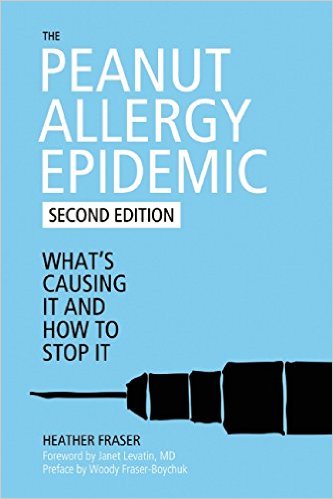In 1995, a taste of peanut butter sent Heather Fraser's one-year-old son into anaphylactic shock. He was part of the "first wave" of kids in what has become an epidemic—today 1 in every 13 kids has a life-threatening food allergy. With a background in historical research, Heather set out to investigate what's behind this alarming trend, reading everything she could find: medical literature, textbooks, the history of anaphylaxis and allergy. She eventually found her answer – that "the history of vaccination had been bowdlerized," and in 2008 wrote a groundbreaking book, "The Peanut Allergy Epidemic."
Now in its second release, as a new batch of kindergarteners head off to school with Epi Pens in hand, Heather's book is a must-read for all parents. Read on for her insights into what she thinks is really behind the allergy epidemic and what we, as parents, can do about it.
What's with all the food allergies in kids these days?
The answer is simple and the science is straight-forward, but it's also highly controversial: vaccination is responsible for the epidemic levels of life threatening allergies to peanut and other foods in children. 100-plus years of medical literature, every vaccine package insert and a Nobel Prize given in 1913 all explain how vaccination causes life threatening anaphylaxis and allergy/atopy to what is in the shot. But vaccination also sensitizes kids to what's in the air and the body at the time of, and after, each injection. Our bodies respond with allergy when our immune systems become overwhelmed by toxins that can be linked to foods or other substances. Since the late-1980s, our increasingly aggressive vaccine schedules, combinations of vaccines and ingredients in those vaccines have created an epidemic of allergic kids.
RELATED: Why I Want the Choice to Opt-Out of Vaccinating My Child
Can you explain specifically what changed around that time to create this problem?
Vaccines became even more potent, administered in larger combinations (5 or even 7 in a single needle) and powerful immune stimulating additives such as aluminum and conjugate toxoids are included in their formulas as a way to stimulate an immune response. At the same time, health officials in the US, Canada, the UK, Australia and other Westernized counties began to target children at younger ages. Coverage rates quickly rose from about 65% with the old schedules to 95% by 2000 with the new schedule. The pairing of potent vaccines with high coverage rates launched the allergy epidemic in these countries.

So more babies getting more vaccines has resulted in more kids with severe allergies?
Such powerful vaccines more readily create allergy in infants—whose immune systems are immature—to what is in the shot as well as what is in the air and the body at the time of (or after) vaccination. And once the child is made atopic, he or she becomes vulnerable to ever more allergies. The link between food allergies and ear infections is well documented. Ear infections and recurring ear infections in children has led to the widespread and unchecked use of antibiotics, which further disrupts the gut and immune system, leading to more allergy.
Why wasn't this connection between vaccines and allergies noticed (and resolved) right away?
We were unaware that there was a significant allergy problem among children until they showed up for kindergarten in the early 1990s. But the timing of the epidemic is unmistakable. It's confirmed by ER records, cohort studies and, significantly, the eye-witness accounts of teachers confronted by a surge of severely allergic children at that time.
Early in the epidemic, doctors seemed more willing to address and answer the question of how and why this was happening. They pointed to vaccination (in the medical literature and in video) and wondered whether the policy of mass vaccination from birth was worth it. Today, however, doctors deliberately avoid discussion of causes and instead focus on treatment, where there is much money to be made.
Knowledge is a mom's best defense. There are no safe vaccines. They are defined in law as inherently and unavoidably risky.
But again, no doctor or allergist can deny that vaccination causes allergy and anaphylaxis. It's in the vaccine package inserts. But, in my opinion, a full understanding of the development of long-term allergic conditions is not something doctors are usually willing to take responsibility for or discuss at length at all—their focus is on getting as many kids vaccinated as possible. If a doctor were to speak out, he or she would be vilified by peers and the mainstream press. Such a doctor would be unable to find work. There is a climate of fear that keeps doctors silent today. Doctors cannot solve the "mystery" of the allergy epidemic because they are part of the problem.

So why don't all kids who get vaccinated have food allergies? Is this just kind of an issue of Russian Roulette or do things like genetic predisposition come into play? Maybe pediatricians need to be screening babies' families closely for history of atopic disease?
Well, allergy is not a "disease." This is a huge clue to understanding what has occurred with our children. It's a defense we are all programmed to create when overwhelmed by toxicity. Tendency to allergy may be inversely related to one's ability to detoxify. Margie Profit indicated in her 1991 essay "The Function of Allergy" that allergy is a final and sometimes risky natural defense against toxins linked to benign substances. The scratching, vomiting, diarrhea, coughing and sneezing are attempts to eject a toxin as quickly as possible from the body. The drop in blood pressure is intended to prevent the toxin from reaching vital organs. Allergy is established when the general defenses of the body have been insufficient in preventing a specific toxin from accessing the bloodstream.
Sources like the vaccine package inserts or government websites including the CDC indicate that anaphylaxis to any vaccine or vaccine component means you should not be vaccinated with it again. Allergies to certain antibiotics are a significant concern as is allergy to latex depending on the vaccine. Epilepsy or nervous system problems are also a serious concern according to package inserts. Inconsolable screaming and seizures following the DTP shot in particular means this shot may be wholly inappropriate for your child, which is another red flag. Parents need to be vigilant and vocal.
What can parents do to prevent food allergies in their kids?
Knowledge is a mom's best defense. There are no safe vaccines. They are defined in law as inherently and unavoidably risky. Further, vaccination is not about the health of my child. If it were, there would be screening for my child's kidney and liver health. Does my child have mitochondrial issues? Vaccination is a one-size-fits-all deal that has caused injury and death. In Canada, the story of PENTA is the cautionary tale for parents. (See pentaproject.net) This was the unlicensed and damaging vaccine my son received.
I encourage every parent to read the vaccine package inserts. Read everything. Ask questions of many people: parents, doctors, vaccine makers, and nurses, and demand answers. If you are not satisfied you have the right to say no. You have the right to wait and think about it, and to research on your own. In the US, the Vaccine Injury Act has prevented parents from suing a vaccine maker. Any compensation requires a "no fault" concession.
RELATED: 10 Things Not to Say to an Allergy Mom
California recently passed a law, SB277, mandating vaccines for all children who attend both private and public schools. What can parents do in the face of such legislation?
Mandatory vaccination laws point to the degree to which government owns the bodies of its citizens. Vaccination is a medical procedure requiring the informed consent of parents. Any law that removes the right to informed consent is unethical and immoral.
The ultimate protection from vaccine-induced anaphylaxis and atopy in children is the right parents have to say no. SB277 has removed this consumer protection. And without meaningful screening by health officials for underlying conditions and toxic burdens in children the allergy epidemic will intensify.
After the experience I had with my son and vaccination—the vaccine he received turned out to be an experimental vaccine, unlicensed and caused widespread and documented injury that doctors have yet to acknowledge and that also left my son injured and with severe allergies—I realized I had been asleep. Yes, vaccines contain risk. But the fact that government, doctors, the manufacturer risked my son's life (11,000+ injury reports that included 15 deaths) to capitalize on a market opportunity takes the risk to another level and category. That this could have been allowed to happen is the very reason for informed consent. Being fully informed, finally, I refused further vaccines for my son and my second child. I exercised my right to say no.
It is possible to ask the government for changes that might include single vaccines and a schedule that delays shots until the kids are two or three. We can implement a screening process. We can ask for a safety study of the schedule as a whole—something that has never been done.
But the forces behind the vaccination schedule are enormous. The profits from this mature market are huge. The new mandatory vaccination bill SB277 in California, as well, which a majority of California voters opposed, would suggest that negotiation is far from easy. Regardless, it's imperative that parents make their voices heard.




